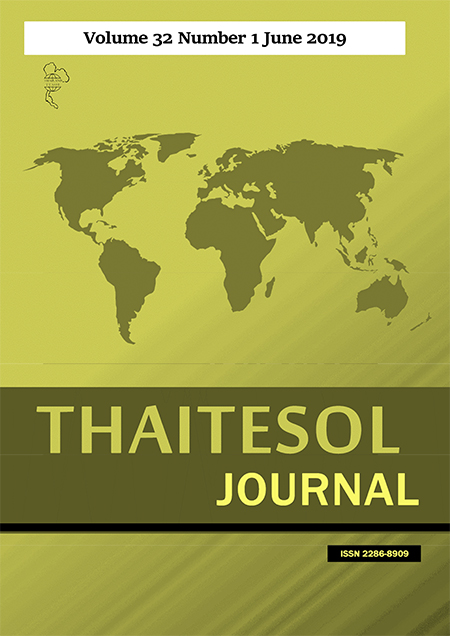An Investigation of the Transactional Competence of International University Students Performing Task-based Communication
Main Article Content
Abstract
Task-based communication is an inescapable fact of university life, both inside and outside the classroom. The research of this study is interested in how international university students perform closed oral tasks by exploring the communication strategies used to complete such “transactions.” This study used a task-based pre-test/post-test methodology to examine if the treatment of teaching communication strategies affects transactional competence. Through a qualitative and quantitative assessment of task-based communication, this study observed ten international university students throughout twelve weeks while investigating their ability to negotiate meaning to complete the tests. The investigation focused on achievement strategies such as asking for clarification or confirmation and interactional strategies such as comprehension checks. The research found that the referential nature of the task and the directive function of language instigated a variety of Language Related Episodes that varied in their complexity depending on the interlocutors. These episodes demonstrated that there is a necessity for greater awareness of communication strategies to enhance the transactional competence and resulting communicative performance of international university students.
Article Details
Materials in THAITESOL JOURNAL may be photocopied for educational purposes. Under no circumstances may any part of this journal be photocopied for commercial purposes.
References
Brown, G. & Yule, G. (1983). Discourse Analysis. Cambridge: Cambridge University Press.
Dornyei, Z. & Scott, M. L. (1997). Review Article Communication Strategies in a Second Language: Definitions and Taxonomies. Language Learning, 47(1), 173-210.
Ellis, R. (2003). Task-based Language Learning and Teaching, Oxford: Oxford University Press.
Ellis, R. (2008). The Study of Second Language Acquisition. (2nd ed.). Oxford: Oxford University Press.
Faerch, C. & Kasper, G. (1983). Strategies in Interlanguage Communication. Harlow, UK: Longman.
Kim, Y. (2012). Task complexity, learning opportunities and Korean EFL learners' question development. Studies in Second Language Acquisition, 34, 627-658.
Long, M. (2015). Second Language Acquisition and Task-based Language Teaching. West Sussex: Wiley.
Mackey, A. (2012). Input, Interaction, and Corrective Feedback in L2 Learning. Oxford: Oxford University Press.
Shortreed, I. (1993). Variation in Foreign Language Talk: The Effects of Task and Efficiency. In G. Crookes & S. Gas (Eds.), Tasks and Language Learning: Integrating Theory and Practice (pp.96-122). Clevedon, Avon: Multilingual Matters.
Skehan, P. (1998). A Cognitive Approach to Language Learning. Oxford: Oxford University Press.
Swan, M. & Smith, B. (Eds.), (2001). Learner English: A Teacher’s Guide to Interference and Other Problems. (2nd ed.). Cambridge: Cambridge University Press.
Swain, M. (1995). Three Function of Output in Second Language Learning. In G. Cook & B. Seidlhofer (Eds.). Principles and Practice in Applied Linguistics: Papers in Honour of H.G. Widdowson (pp.125-144). Oxford: Oxford University Press.
Swain, M. & Lapkin, S. (1998). Interaction and Second Language Learning: Two Adolescent French Immersion Students Working Together. The Modern Language Journal, 82, 320-337.
Tarone, E. (1980). Communication Strategies, Foreigner Talk, and Repair in Interlanguage. Language Learning, 30, 417-431.
Tarone, E. (1981). Some Thoughts on the Notion of Communication Strategy. TESOL Quarterly, 15, 285-295.
Tenbrink, T., Andonova, E., Schole, G., & Coventry, K.R. (2017). Communicative Success in Spatial Dialogue: The Impact of Functional Features and Dialogue Strategies. Language and Speech, 60 (2), 318-329.
Yule, G. (1997). Referential Communication Tasks. Mahwah, NJ: Lawrence Erlbaum.

